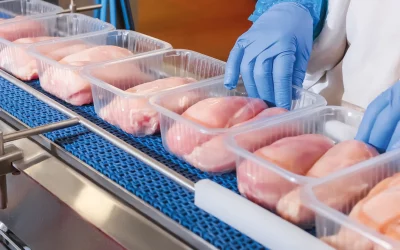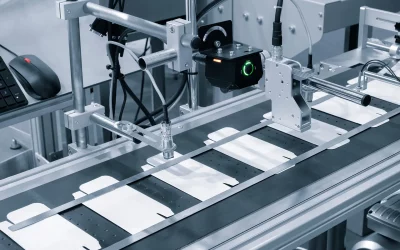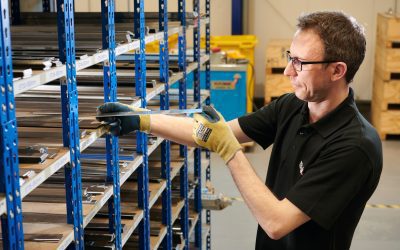What are the benefits of blade coatings?
You might be wondering if specifying your industrial blades with additional coatings is really worth it? After all, does coating really make much difference?
In our experience, the answer is a resounding ‘yes’.
Depending on the type of steel your blade is manufactured from and the applications in which it is being used, an appropriate coating can not only extend the life of the blade but can deliver other benefits such as providing consistent cut quality, preventing adhesive build-up, improved release properties, corrosion resistance and more.
These aren’t trivial benefits. Making your steel blades last longer, whilst maintaining cut quality will have both indirect and direct benefits for your wider operations.
What are the different types of industrial blade coatings?
So on to the coatings themselves. There are several types of coating that are predominantly used on industrial knives.
We’ve set out each of these coating types below.
Teflon Non-Stick Coating
Similar to the non-sticking coating you find on consumer frying pans, this form of Teflon non-stick coating is a ‘beefed up’ version for industrial applications.
Teflon non-stick coating is ideal for cutting applications that involve food, plastics or adhesives. After all, the more you can deter adhesion build-up on your cutting blades, the less downtime you’ll experience.
It’s important to note that there are multiple different formulations of Teflon non-stick coating. These formulations introduce different properties to the coating such as improved wear resistance, more or less bonding/cohesion, and improved release properties.
The type of Teflon non-stick coating you want for your steel blades will depend on which of the aforementioned properties is most important for your particular use case.
However, some of these benefits do come at an expense to the steel blade’s performance. Teflon non-stick coating is typically applied with a .001” to .004” thickness. This can dull sharpened edges and impact the way the blade fits in a machine.
Titanium Nitride (TiN) Coating
If you want to maintain the cutting integrity of your steel blade, then using a Titanium Nitride (TiN) coating is one of the best things that you can do.
This coating takes the form of an incredibly hard ceramic powder. You’ll typically find this coating used not only on steel blades but on titanium alloys, carbide and aluminium parts. Titanium Nitride coating is also widely used on surgical implements due to its non-toxic properties.
Titanium Nitride is applied as a Physical Vapor Deposition. This is a vacuum deposition process whereby the Titanium Nitride goes from a condensed phase to a vapour phase and then back to a thin film condensate phase. This process helps to create a coating which is far harder than coatings which are applied using the electroplating process.
The use of PVD also ensures that the TiN coating is thin (typically a coating of under 0.00020”!), has high-impact strength and excellent abrasion resistance.
The use of a Titanium Nitride coating is particularly recommended if you want to both decrease the friction of your blade’s surface, as well as strengthen the cutting edge.
Titanium Carbon Nitride (TiCN) Coating
A Titanium Carbon Nitride (TiCN) coating tends to be used in similar applications as TiN coatings, but has a significant difference – it contains carbon as a further chemical element.
As a chemical compound of the elements titanium, carbon and nitrogen, TiCN coating is particularly hard (32 Gigapascal (GPa) whilst also being tough. Thanks to these properties, a TiCN coating is especially useful for blades that will be used in situations that require high cutting speeds.
A TiCN coating also has a friction coefficient of only 0.2μ, which is exceptionally low. This means that it’s possible to significantly extend the service life of a steel blade by using a TiCN coating (this service life can be as much as four or five times longer than an uncoated steel blade).
Blades that are coated in TiCN are suited to applications such as the cutting of hard materials like steel, stainless steel, cast iron, as well as other softer materials such as brass and plastics.
Electroless Nickel Plating
As the name suggests, electroless nickel plating differs from traditional electroplating as it doesn’t require the passage of an electrical current through the bath and substrate.
Instead, electroless nickel plating (oftentimes referred to as ENP) involves the deposit of a nickel-alloy coating by chemical reduction. The ENP is deposited on the surface of the blade by reducing nickel ions to metallic nickel with a chemical reducing agent such as sodium hypophosphite.
One of the advantages of electroless nickel plating is that the process creates an even coating layer, regardless of the surface structure of the blade. This is in stark contrast to electroplating where the underlying shape of the blade can affect the current density and hence the coating’s application.
Electroless nickel plating is particularly noted for conferring corrosion and wear resistance to blades.
Diamond-Like Carbon (DLC) Coating
If you want your industrial blades to have a high level of hardness, a low friction coefficient, high resistance to corrosion and a smooth surface, then a diamond-like carbon (DLC) coating could be the ideal choice.
A DLC coating is valued in many use scenarios as it provides some of the properties of diamond to the item it is coating. So, for industrial blades and knives, a DLC coating can extend a blade’s operational life, hardness, and perhaps most notably slickness (DLC film friction coefficient against polished steel ranges from 0.05 to 0.20).
It’s because of these properties that many types of machinery involved in high-speed food packaging use blades which are coated in DLC.
Better blades, better business
If you’re looking for blades that’ll outperform their OEM equivalents and offer improved value for money and consistent performance, then speak to MRMK today.
Situated in the heart of Sheffield’s steel industry, MRMK is creating a new standard in machine knife manufacturing. Whether you want standard blades adapted to your requirements, or something completely bespoke, then get in contact today. Remember, our machine knives are expertly engineered to perfectly fit all leading brands.
Speak to MRMK about your industrial blade requirements now
Find out more about industrial machine knives and coatings on the MRMK news and insights hub…
Choosing the Right Industrial Blade Supplier for Your Operations | What Are the Different Types of Packaging Machine Knives? | OEM Knives and Blades: Are They Really the Best Option?


 +44 (0) 1909 519815
+44 (0) 1909 519815 


